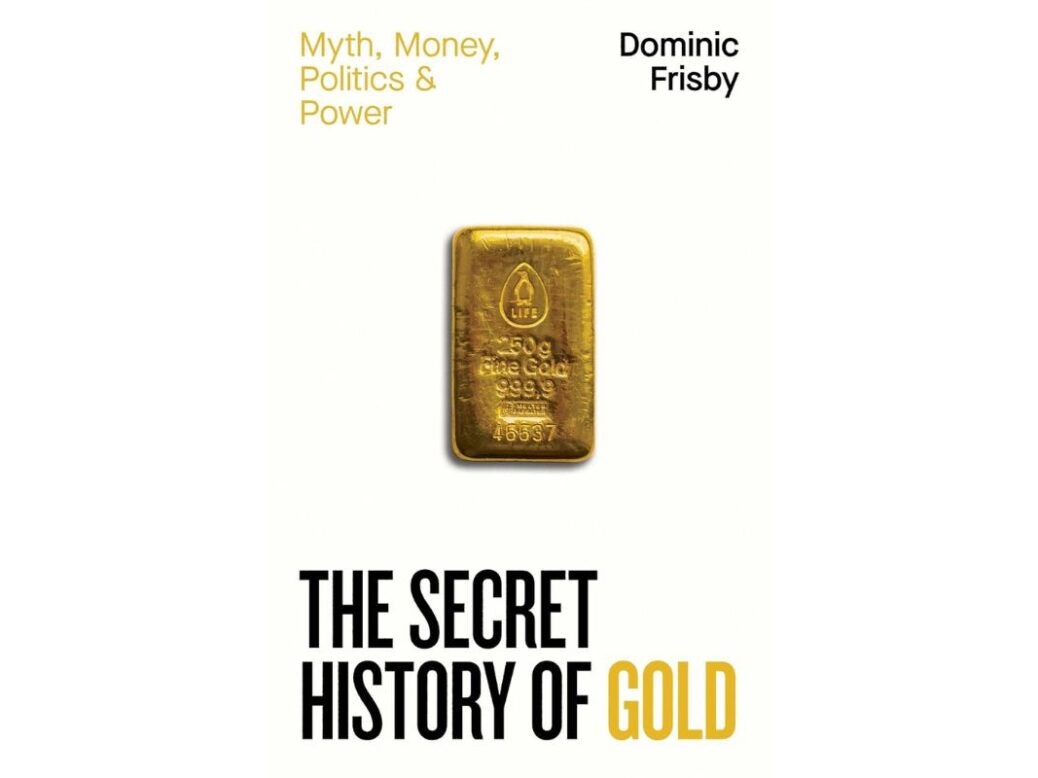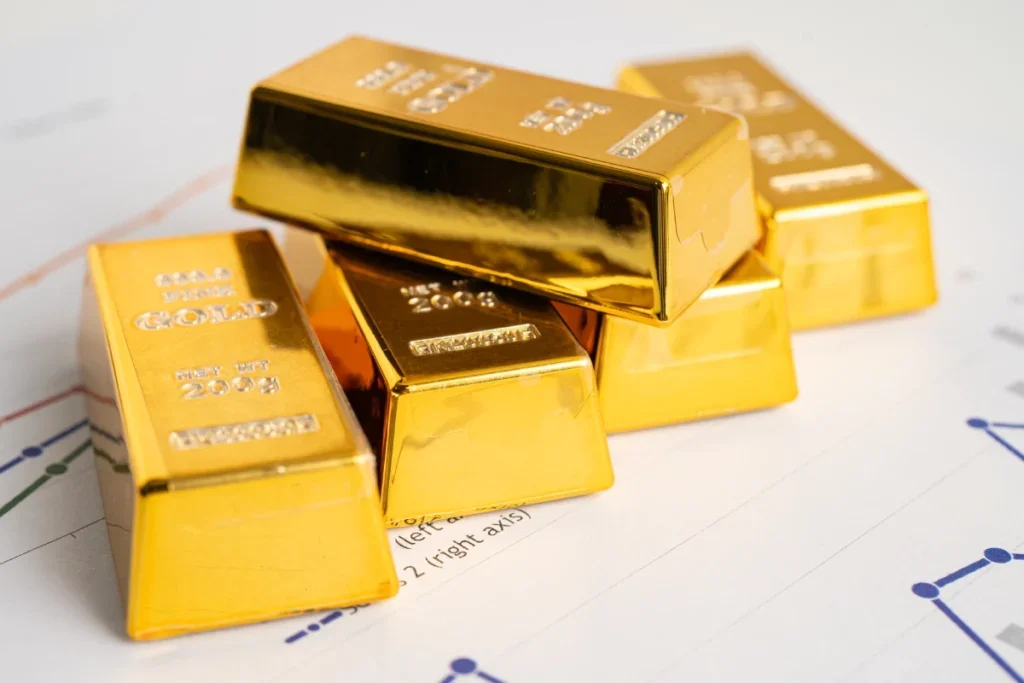
Gold was present in the dust that formed the solar system. It does not decay over time. It can be stretched into the thinnest wire or beaten into leaf a single atom thick. It can be hidden in dank caves or sunk on the seabed and recovered unharmed centuries later. But it can never be destroyed. The gold you wear on your finger or round your neck is older than the earth itself and will exist long after humanity has expired.
No wonder, as Dominic Frisby argues in this lively, short account of the precious metal’s impact on society and economics, that from the ancient Egyptians and the Incas to the prospectors of the Yukon and the specialised category of ‘goldbug’ investor today, we’re fascinated by a glinting allure that has also been the cause of so much folly, strife and criminality down the ages.
[See also: Gold shines bright – but is it really a safe bet?]
But in this digital age, we might well ask how the concept of a timeless physical store of wealth stands up against the convenience of on-screen account-holding, or indeed the thrill of cryptocurrency trading. Does gold, which pays no interest and is so costly to store in bulk and insure, really have a future?
And while we’re on the subject, let’s ask a more philosophical question: does gold have a moral conscience? Or, if that’s an impossibility because it’s no more than lumps of metal, what should be our balanced judgement as to its overall influence on human behaviour? Does gold do good in the world, or does it do evil?

Frisby certainly believes gold still has a purpose. He’s a committed goldbug himself: ‘Needless to say, I urge everyone to own some gold in their portfolio,’ declares an author’s note. He was also an early enthusiast for crypto as the author of the 2014 book Bitcoin: The Future of Money?, and he’s a correspondingly fierce critic of ‘fiat currency’, meaning state-issued money that is not linked in value to gold reserves.
Some readers may be disappointed that he doesn’t dive into the hot-button question of whether cryptocurrency is about to replace gold as the pre-eminent safe-haven investment in these times of turbulence.
Crypto-sceptics say stick with gold, whatever its short-term price performance. First because its value has held strong over long periods of time: Frisby provides persuasive data relative to house prices and wage rates, for example. And second because it will always be there, whereas Bitcoin and every other item of electronic data could be zapped by some unforeseen cyber-cataclysm and, to quote the Bard, leave not a wrack behind.
But that’s not Frisby’s position.
He is also the author of Life after the State (2013, republished 2024), which was described by another critic as ‘a rollicking defence of anarcho-capitalism’, and his fundamental position can be summarised as ‘anything but fiat’. In essence he regards both gold and Bitcoin as morally and financially sounder than the incompetent governments whose actions devalue currencies and leave citizens poorer in spending power.
Gold and the world
But what of gold’s wider influence on world affairs, including its role in the two great wars of the 20th century? The resort to ‘paper and debt’ and the abandonment of gold in the financing of the first war set the stage, Frisby argues, ‘for Weimar hyperinflation, the rise of Nazism and another war… It simply could not have happened to anything like the same degree’ if limited holdings of gold had also set limits on government action.
If that lies in the realm of hypothesis, Frisby’s account of real-life gold shenanigans in the second war is much more troubling. It is ‘staggering’, to use his own word, to be told that ‘a 2010 study by the German Ministry of Finance found that stolen Jewish wealth [in gold and other forms of treasure] paid for roughly one-third of Germany’s Second World War effort’.
[See also: The best wealth managers for high-net-worth clients]
Equally horrifying was Operation Golden Lily, Japan’s systematic plundering of gold from conquered nations that was launched in 1936 by Emperor Hirohito himself and led by his brother and cousin. The stolen hoard amassed in South East Asia and shipped to the Philippines by General Tomoyuki Yamashita was just one portion of a colossal haul, much of which – as with ill-gotten Nazi gains – was never traced or recovered.
But the possibility of finding Yamashita’s gold has hypnotised all sorts of gullible folks ever since, including, bizarrely, a dentist from Northern called Colin Howell, who in 1991 murdered his wife and won a £400,000 insurance payout by framing her death as suicide. He went on to lose the lot on a Yamashita scam (a tale well told in the 2016 TV drama The Secret).
So far we’ve learned that gold can provide useful discipline for national treasuries, but that it can also lead the wicked and the weak into atrocious and delusional acts.
It has also provoked some terrible decisions. In 1886 a man called George Harrison (not that one, a prospector in South Africa) made the main discovery of the Witwatersrand field that went on to produce perhaps 30 per cent of all the gold ever mined – but he sold his claim for £10 and disappeared.
[See also: Book reviews: war, wealth and the fate of the US dollar]
Still, at least he did no harm. The UK media has been a lot less forgiving of Gordon Brown, who as Chancellor of the Exchequer in 1999 ordered the sale of 415 of the UK’s 715 tonnes of reserve gold at what turned out to be the lowest price point of the era – around £150 per ounce, compared with £2,200 by the time Frisby is writing, and more than £2,400 at the time that this edition of Spear’s went to press. How many hospitals would that notional loss have paid for?
Frisby, who is also a comedian, writes with a light touch. But this is not a trivial book: on the contrary, it is deeply thought provoking, particularly as to what makes for good national governance. And having thought about that issue, some might conclude, in the manner of the Rev JC Flannel in Private Eye of long ago, that gold has brought both good and evil to civilisation.
But Frisby is more positive: ‘Gold is inherently honest. It brings a natural order to things… Its value cannot be distorted by the whims of politicians or bankers. The world would be a better place with a monetary system underpinned by gold.’ That’s a minority view these days, but he argues it with clarity and passion.
The Secret History of Gold: Myth, Money, Politics and Power by Dominic Frisby (Penguin Business, £22, from 28 Aug)
This article first appeared in Spear’s Magazine Issue 96. Click here to subscribe







